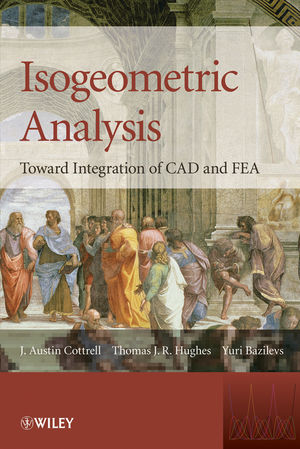Isogeometric Analysis: Toward Integration of CAD and FEAISBN: 978-0-470-74873-2
Hardcover
360 pages
September 2009
 This is a Print-on-Demand title. It will be printed specifically to fill your order. Please allow an additional 10-15 days delivery time. The book is not returnable.
|
||||||
1 From CAD and FEA to Isogeometric Analysis: An Historical Perspective
1.1 Introduction
1.2 The evolution of FEA basis functions
1.3 The evolution of CAD representations
1.4 Things you need to get used to in order to understand NURBS-based isogeometric analysis
Notes
2 NURBS as a Pre-analysis Tool: Geometric Design and Mesh Generation
2.1 B-splines
2.2 Non-Uniform Rational B-Splines
2.3 Multiple patches
2.4 Generating a NURBS mesh: a tutorial
2.5 Notation
Appendix 2.A: Data for the bent pipe
Notes
3 NURBS as a Basis for Analysis: Linear Problems
3.1 The isoparametric concept
3.2 Boundary value problems
3.3 Numerical methods
3.4 Boundary conditions
3.5 Multiple patches revisited
3.6 Comparing isogeometric analysis with classical finite element analysis
Appendix 3.A: Shape function routine
Appendix 3.B: Error estimates
Notes
4 Linear Elasticity
4.1 Formulating the equations of elastostatics
4.2 Infinite plate with circular hole under constant in-plane tension
4.3 Thin-walled structures modeled as solids
Appendix 4.A: Geometrical data for the hemispherical shell
Appendix 4.B: Geometrical data for a cylindrical pipe
Appendix 4.C: Element assembly routine
Notes
5 Vibrations and Wave Propagation
5.1 Longitudinal vibrations of an elastic rod
5.2 Rotation-free analysis of the transverse vibrations of a Bernoulli–Euler beam
5.3 Transverse vibrations of an elastic membrane
5.4 Rotation-free analysis of the transverse vibrations of a Poisson–Kirchhoff plate
5.5 Vibrations of a clamped thin circular plate using three-dimensional solid elements
5.6 The NASA aluminum testbed cylinder
5.7 Wave propagation
Appendix 5.A: Kolmogorov n-widths
Notes
6 Time-Dependent Problems
6.1 Elastodynamics
6.2 Semi-discrete methods
6.3 Space–time finite elements
7 Nonlinear Isogeometric Analysis
7.1 The Newton–Raphson method
7.2 Isogeometric analysis of nonlinear differential equations
7.3 Nonlinear time integration: The generalized-α method
Note
8 Nearly Incompressible Solids
8.1 B formulation for linear elasticity using NURBS
8.2 F formulation for nonlinear elasticity
Notes
9 Fluids
9.1 Dispersion analysis
9.2 The variational multiscale (VMS) method
9.3 Advection–diffusion equation
9.4 Turbulence
Notes
10 Fluid–Structure Interaction and Fluids on Moving Domains
10.1 The arbitrary Lagrangian–Eulerian (ALE) formulation
10.2 Inflation of a balloon
10.3 Flow in a patient-specific abdominal aorta with aneurysm
10.4 Rotating components
Appendix 10.A: A geometrical template for arterial blood flow modeling
11 Higher-order Partial Differential Equations
11.1 The Cahn–Hilliard equation
11.2 Numerical results
11.3 The continuous/discontinuous Galerkin (CDG) method
Note
12 Some Additional Geometry
12.1 The polar form of polynomials
12.2 The polar form of B-splines
Note
13 State-of-the-Art and Future Directions
13.1 State-of-the-art
13.2 Future directions
Appendix A: Connectivity Arrays
A.1 The INC Array
A.2 The IEN array
A.3 The ID array
A.3.1 The scalar case
A.3.2 The vector case
A.4 The LM array
Note
References
Index



